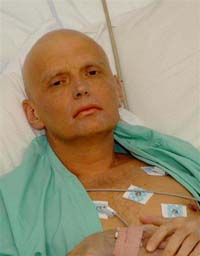Russia opens criminal case in to Litvinenko killing
Russia has opened a criminal case in to the poisoning death of ex-spy Alexander Litvinenko and for the attempted killing of associate Dmitry Kovtun, the prosecutor general's office said Thursday.

The move would allow suspects to be prosecuted in Russia. Officials previously have said that Russia would not extradite any suspects in the killing of Litvinenko, who died in London on Nov. 23.
A brief statement from the prosecutor general's office did not say when the criminal case was opened.
British detectives came to Moscow this week to observe the interrogation by Russian authorities of figures linked to the case.
"As a result of examinations it was established that Litvinenko died as a result of poisoning by a radioactive nuclide (substance) and that Kovtun, who met with Litvinenko in London in October 2006, developed an illness also connected with the radioactive nuclide (substance)," the statement said.
Kovtun had not previously been reported to have fallen ill. Another Litvinenko associate, Andrei Lugovoi, is undergoing medical tests in a Moscow hospital, according to his lawyer.
Lugovoi was to have been questioned Thursday, but the meeting with investigators was postponed, lawyer Andrei Romashov said.
Kovtun's and Lugovoi's business interests and love of soccer had taken them to London on Nov. 1, the day Litvinenko fell ill.
They and another Russian businessman say they met with Litvinenko briefly that day at a hotel bar before attending a soccer match between CSKA Moscow and Arsenal.
Traces of polonium-210, the isotope that killed Litvinenko, had been found at two spots in the stadium, Britain's health agency said. Radiation traces also have been found at the hotel bar, and about 10 other places in London.
The British Embassy in Moscow said Wednesday that traces of radiation had ben found there, but that it was not life-threatening. Kovtun and Lugovoi visited the embassy last month to discuss the Litvinenko case with British officials.
Foreign Minister Sergey Lavrov said Thursday said British agents' investigation of the case has not affected Russia's attitude toward relations with Britain.
Widespread speculation that Russian officials could have been behind the poisoning of Litvinenko, who fled Russia in 2000 and received British citizenship, has been seen as damaging Russian-British relations.
But Lavrov said, "On our part, the Scotland Yard investigation is not affecting our political relations in any way. As to the British side, I cannot judge.
"But as I've said already, the attempt to launch a campaign around the case and turn it into a political sensation has already bogged down," he said.
Also Thursday, a Russian newspaper reported that Yegor Gaidar, a former prime minister who fell severely ill the day after Litvinenko's death, is certain his mysterious sudden illness was caused by poisoning and that opponents of Russian authorities were likely responsible.
Gaidar is a 50-year-old liberal economist who served briefly as prime minister in the 1990s under President Boris Yeltsin and is a leader of a Russian liberal opposition party. He became violently ill during a conference in Ireland on Nov. 24 and was rushed into intensive care at a hospital.
Gaidar's illness fueled speculation of a hunt against liberal Russians, including journalist Anna Politkovskaya, who was gunned down in her apartment building in October. Neither that killing nor Litvinenko's has yet been solved.
In an article published Thursday in the Vedomosti daily, Gaidar described the onset of his illness and the symptoms: irresistible fatigue, bleeding from the nose and mouth, vomiting and losing consciousness,reports AP.
He said he excluded the possibility that Russian authorities could be responsible, since Litvinenko's death, which has greatly damaged Russia's image, would not be in their interest.
"That means that more likely than not, someone among the open or hidden enemies of the Russian authorities, those who are interested in a further radical deterioration of ties between Russia and the West, stands behind this."
Subscribe to Pravda.Ru Telegram channel, Facebook, RSS!


